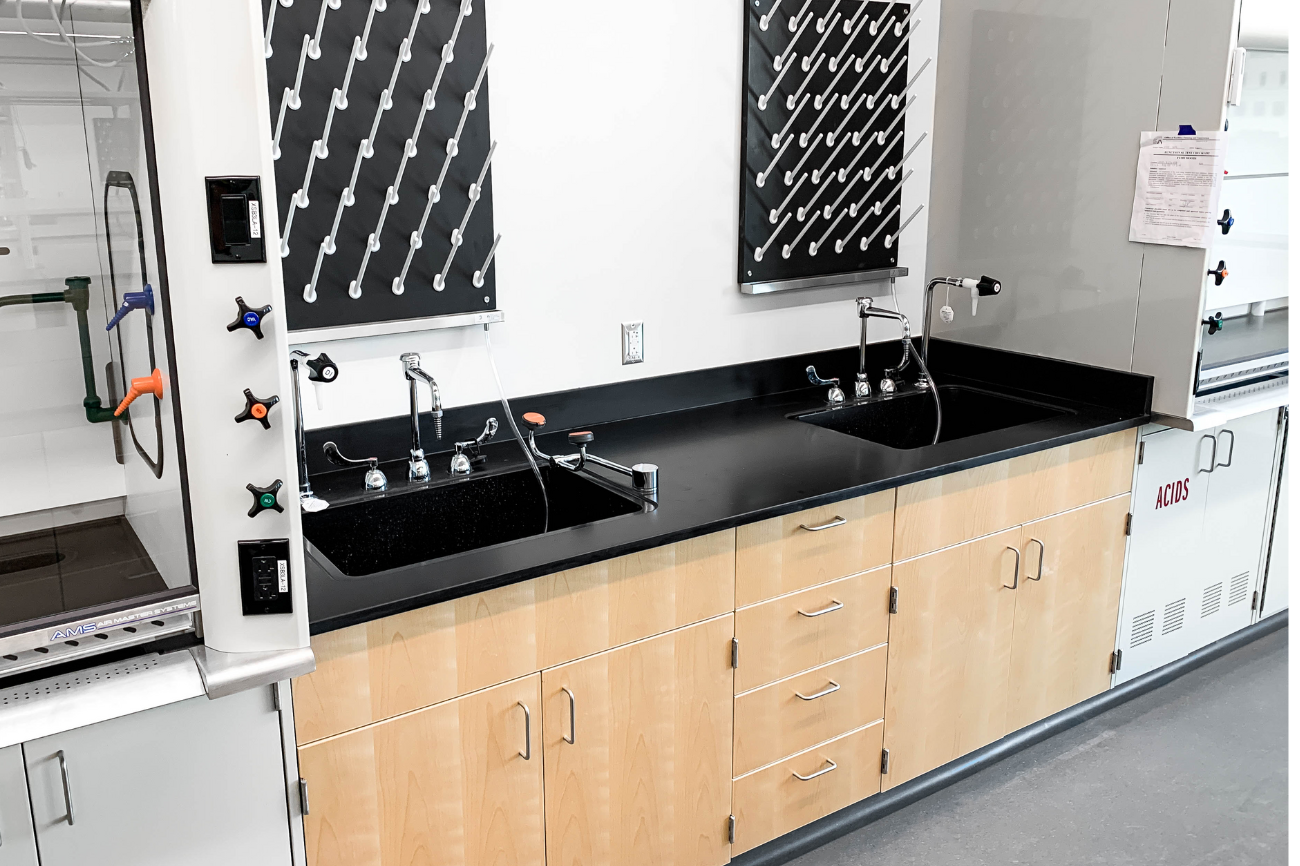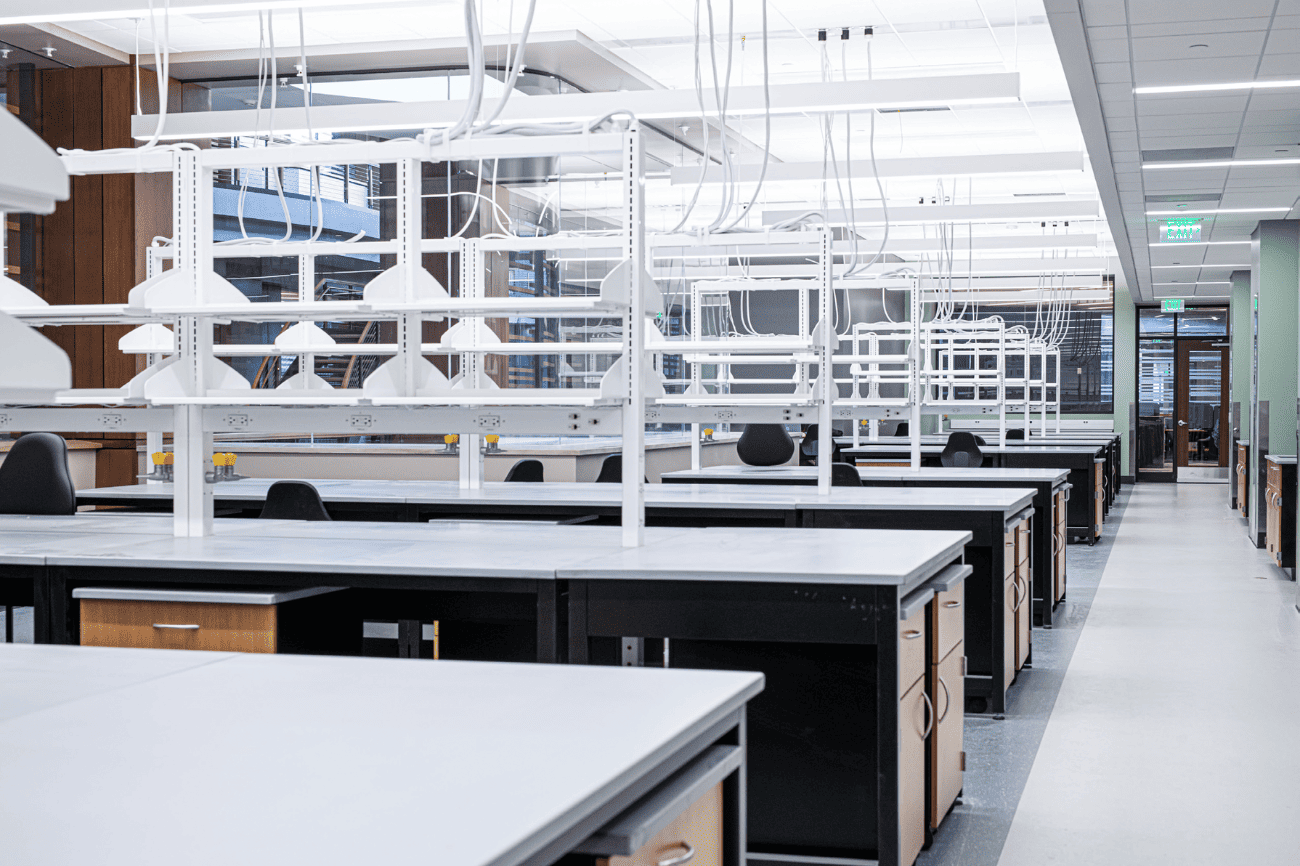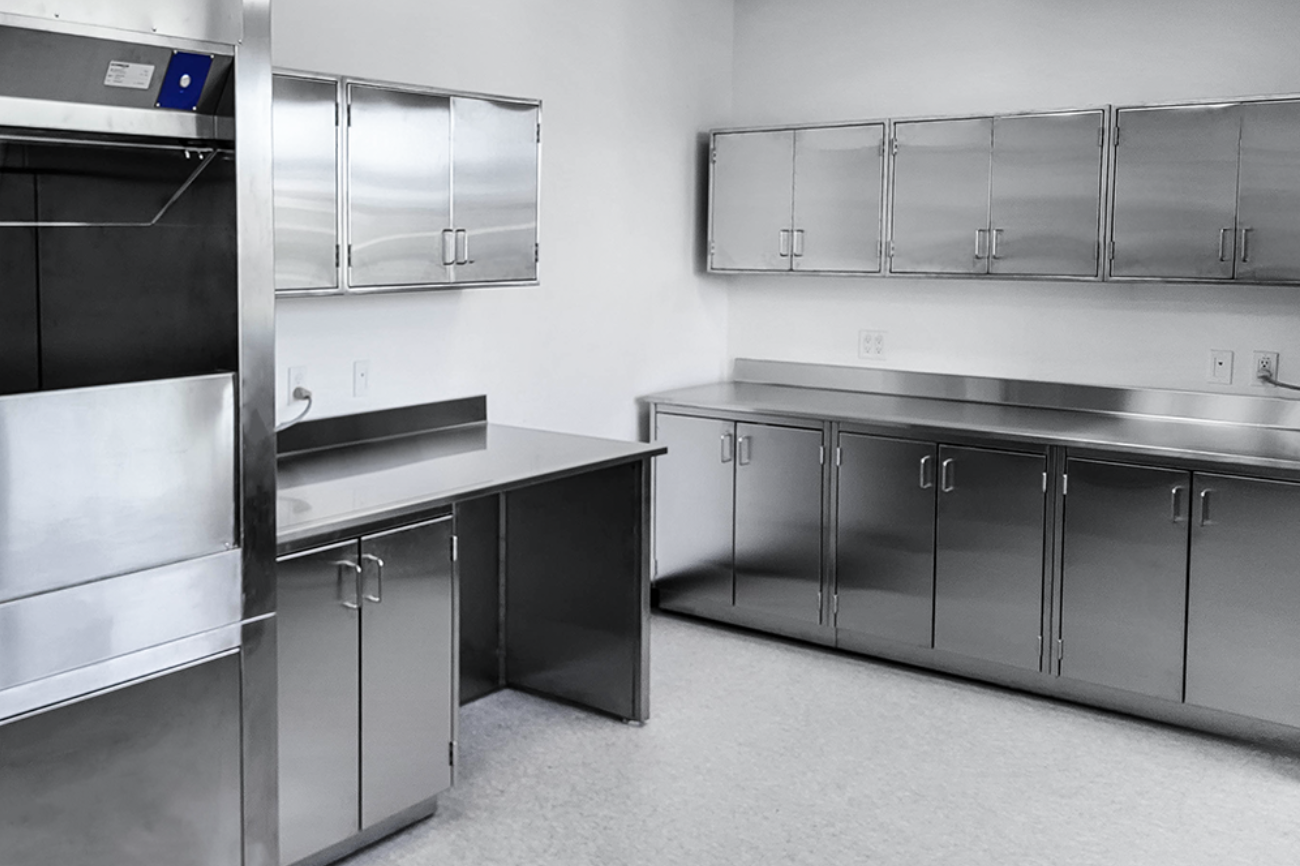How to Choose Your Lab Countertop Material
Written by Canadian Scientific
Designing a lab is an exciting opportunity, but let’s be honest—it can also be a bit daunting, especially when it comes to picking out the right furniture materials. You’ve probably got a good handle on the basics, but when it comes to choosing the perfect surfaces for your lab tables and benches, things can get tricky. With so many options out there, how do you know which one will not only meet your needs today but also stand up to whatever the future has in store? Don’t worry, we’ve got you covered! In this guide, we’ll help you navigate lab-grade surface materials so you can pick the right lab countertops.
Phenolic Countertops
Phenolic resin lab countertops are constructed by layering natural kraft paper saturated with phenolic resin and processed under high heat. This process results in a solid, lightweight, and durable countertop.
Advantages
- Durable and lightweight: both strong and lightweight, making it easy to install and versatile for various lab setups.
- High Chemical Resistance: Ideal for labs where exposure to harsh chemicals is routine. Holds up against acids, solvents, or other corrosive substances without degrading or staining.
- Moisture and Fungal Resistance: Non-porous nature of phenolic resin gives it high resistance to moisture, preventing water damage and minimizing the risk of bacterial or fungal growth. An excellent choice for labs that need to maintain sterile conditions or work with biological materials.
- Scratch and Impact Resistance: Designed to resist scratches, impact, and stress fractures, even in labs where heavy or sharp equipment is used regularly. This durability extends the life of the countertop and reduces maintenance costs.
- Moderate Heat Resistance: Phenolic resin can handle continuous exposure to heat up to 350°F, making it suitable for many lab applications where heat is a factor, though it’s not recommended for use with open flames or extremely high temperatures.
- Cost-Effective: Offers a great balance between cost and functionality. Provides many of the same benefits as more expensive materials at a mid-range price point, making it a smart choice for labs that need to manage costs without compromising on quality.
- Versatility: Suitable for a wide range of lab environments, including biological, chemical, clinical, and analytical labs. Their broad resistance to various conditions makes them a versatile option that can adapt to the changing needs of modern laboratories.
Disadvantages
- Not Flame Retardant: Not ideal for labs using open flames.
Best Applications
Phenolic resin countertops are ideal for biological, chemical, clinical, and analytical labs where chemical resistance and hygiene are crucial.
Epoxy Countertops
Epoxy resin lab countertops are made by curing a mixture of materials into a solid, non-porous surface, forming a strong bond. These countertops are known for their durability and resistance to harsh conditions, making them a go-to choice for labs dealing with extreme environments.
Advantages
- Heavy Duty: Can withstand the most demanding lab conditions and constant use without showing signs of wear and tear. Remains intact and durable over time.
- Superior Chemical Resistance: Highly resistant to a wide range of chemicals, including strong acids, solvents, and bases. ideal for laboratories that regularly work with corrosive substances, as the surface won’t stain, corrode, or degrade after exposure.
- High Heat Resistance: Can withstand continuous heat exposure above 350°F, making it suitable for labs that involve high-temperature processes. It’s also flame retardant, which adds an extra layer of safety when working with open flames or heat-generating equipment.
- Hygienic and Easy to Clean: Its non-porous surface makes it exceptionally easy to clean and maintain. Doesn’t absorb liquids or harbor bacteria, fungi, or other contaminants.
- Impact and Stress Resistance: Not only resistant to scratches but also holds up well against impacts and stress fractures.
- Versatile Application: Epoxy resin countertops are versatile enough to be used in various lab settings, including biological science, microbiology, industrial testing, and research and development labs. Whether you're handling harsh chemicals, high heat, or delicate experiments, epoxy resin can meet the demands of your lab.
- Long-Term Value: Although epoxy resin countertops are among the more expensive options, their long-lasting durability and minimal maintenance needs make them a cost-effective choice in the long run. You’re investing in a surface that will serve your lab efficiently for many years without the need for frequent replacements or repairs.
Disadvantages
- High Cost*: Among the most expensive options due to its durability and limited manufacturers.
* Our close partnerships with world class American epoxy manufacturers enable us to sell high quality epoxy lab countertops and work surfaces at an effective price point, with some of the fastest lead times in the industry.
Best Applications
Epoxy resin lab countertops are perfect for biological science, industrial testing, microbiology, and research labs that involve harsh chemicals, open flames, and extreme heat.
Stainless Steel Countertops
Stainless steel lab countertops are made from low carbon steel combined with chromium and nickel, offering resistance to rust, corrosion, and heat. Popular stainless steel grades for science laboratories include 304 and 316.
Advantages
- Exceptional Durability: Can withstand the rigors of daily lab use, including heavy equipment, sharp instruments, and frequent cleaning. Doesn't easily chip, crack, or break, making it a long-lasting option for high-traffic lab environments
- High Heat Resistance: One of the standout features of stainless steel is its ability to endure extremely high temperatures. It can handle continuous heat exposure up to 1500°F without warping or degrading, making it ideal for labs that work with open flames, autoclaves, or other high-temperature processes.
- Corrosion and Chemical Resistance: Highly resistant to corrosion, rust, and many chemicals
- Hygienic and Easy to Clean: Its non-porous surface makes it incredibly easy to clean and sanitize, which is critical in maintaining a sterile laboratory environment. Doesn’t harbor bacteria, fungi, or other contaminants, helping to ensure that your lab meets stringent cleanliness standards.
- Modern Aesthetic: Beyond its functional benefits, stainless steel offers a sleek, modern look that can enhance the overall design of your lab. Its reflective surface can also help to brighten the workspace, making the lab feel more open and professional.
- Versatility: Stainless steel is versatile enough to be used in various lab types, from medical and pharmaceutical to food testing and clean rooms. Its ability to handle different conditions makes it a reliable and flexible choice for a wide range of laboratory applications.
Disadvantages
- Low Scratch Resistance: Susceptible to scratches and dents.
- High Cost: Stainless steel is one of the most expensive options because of the addition of various alloying elements.
Best Applications
Stainless steel lab countertops are ideal for clean rooms, food testing, medical, and pharmaceutical labs, especially where high heat and easy cleaning are priorities.
Plastic Laminate – friend or foe?
If you need a long-term durable lab countertop solution, skip the laminate. An analysis of the advantages and disadvantages will quickly show you why.
Chemical Resistant Laminate Countertops
Overview: Chemical resistant laminate is created by applying melamine resin over decorative surface paper, bonded to a core of kraft papers with phenolic resin.
Advantages
- Mid-Range Cost: More affordable than epoxy resin and stainless steel.
Disadvantages
- Limited durability: Doesn’t hold up well under heavy use. It can easily chip, scratch, or wear down when exposed to sharp instruments or heavy equipment.
- Limited Chemical Resistance: Will resist some chemicals but doesn't offer the high level of protection needed in labs dealing with strong acids, bases, or solvents. Prolonged exposure to harsh chemicals can lead to staining, warping, or even breakdown of the surface.
- Poor Moisture Resistance: Not highly resistant to moisture or water. In environments where spills and exposure to liquids are common, the material can swell, delaminate, or harbor bacteria in seams and edges.
- Heat sensitivity: With a heat tolerance of up to only 275°F, plastic laminate countertops are unsuitable for labs that involve high-temperature processes. Exposing them to sustained heat can cause discoloration, blistering, or other damage.
- Maintenance Challenges: Scratches and chips not only affect its appearance but can also create areas where bacteria and other contaminants can collect, compromising the hygiene of the lab.
Best Applications
Chemical resistant laminate is best suited for beauty salons, dental offices, and photography darkrooms where aesthetics and chemical resistance are needed without exposure to extreme conditions.
High Pressure Laminate Countertops
Overview: High pressure laminate countertops are similar to chemical resistant laminates but are generally more affordable and even less resistant to chemicals.
Advantages
- Affordable: One of the cheapest options.
- Decorative: Wide range of designs and colors.
Disadvantages
- Limited durability: Can easily chip, scratch, or wear down when exposed to sharp instruments or heavy equipment.
- Low Chemical Resistance: Doesn't offer the high level of protection needed in labs dealing with strong acids, bases, or solvents. Prolonged exposure to harsh chemicals can lead to staining, warping, or even breakdown of the surface.
- Poor Moisture Resistance: Not highly resistant to moisture or water. The material can swell, delaminate, or harbor bacteria in seams and edges.
- Heat sensitivity: Exposure to sustained heat can cause discoloration, blistering, or other damage.
- Maintenance Challenges: Scratches and chips not only affect its appearance but can also create areas where bacteria and other contaminants can collect, compromising the hygiene of the lab.
Best Applications
High pressure laminate can be appropriate for tech labs working with little to no chemicals, where aesthetics is important, and the work involves low-risk exposure.
Checklist for Choosing Your Lab Countertop
When selecting a lab countertop, consider the following:
✓ Chemical Resistance — Ensure the material can withstand the chemicals used in your lab.
✓ Heat Resistance — Match the countertop to the maximum heat exposure it will face.
✓ Durability — Assess whether the material can handle heavy equipment and daily wear.
✓ Maintenance — Choose a material that is easy to clean and maintain.
✓ Cost — Factor in both the initial cost and long-term durability.
✓ Appearance — Select a material that complements your lab's design.
✓ Availability — Consider lead times, as availability can affect your project timeline.
By considering these factors, you can ensure that your lab is equipped with countertops that are not only functional and durable but also safe and aesthetically pleasing.
Confidently check off all of the above with lab countertops by Canadian Scientific! Our professional product specialists are here to help guide you through the selection process and set you up with the right surface materials and countertops for your lab. Reach out to get started!
Return to Blog Main Page
Advance your research with full confidence in your lab.

 Products
Products Products
Products

